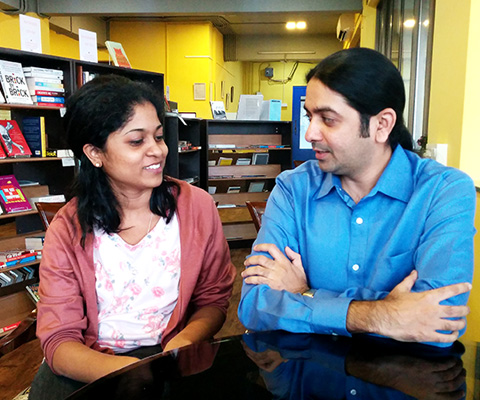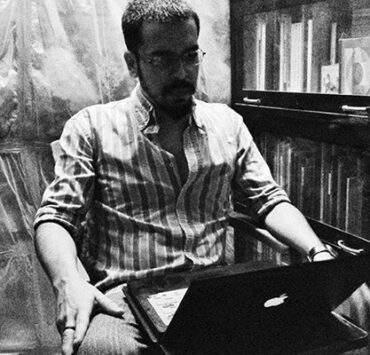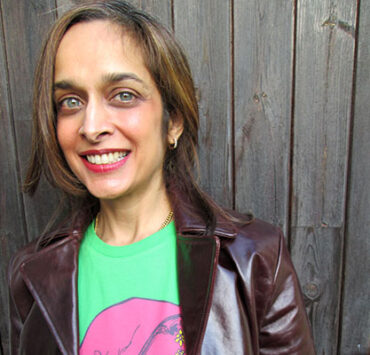In January 2013, Ahalya and Meethil Momaya started what was quite possibly the only library consultancy firm in India. Called the Eternal Library, it was a venture borne out of a fierce love of reading and recommending books to others. The duo soon took the initiative one step further and launched Trilogy earlier this year. Located in the heart of Lower Parel in Mumbai, Trilogy is a one-of-a-kind library, book store, and event space. Spanning close to 2,000 sq. ft., the space is away from the main road, refreshingly quiet, surrounded by trees, and houses books belonging to a wide range of categories.
We caught up with Ahalya and Meethil for an in-depth interview about their love for reading, the Eternal Library and Trilogy, people’s reading habits and the publishing industry in India, and their future plans. Read on for excerpts—
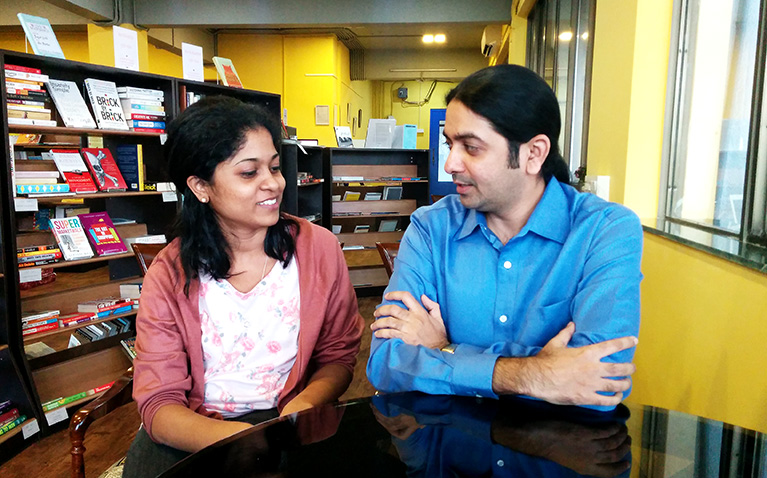
Ahalya and Meethil Momaya, founders of the Eternal Library and Trilogy. Photograph by Arun Kale.
How did the two of you meet?
Ahalya: I tell this story better (smiles). I was working at the Bombay Natural History Society in the publications department, editing their magazine Hornbill. Meethil was the wildlife photographer supplying photos for the magazine and a few other publications. I also used to edit any articles he used to write. He was one of the only writers for the magazine who came back to me about the edits I’d made, pointing out which ones were working and which ones weren’t. I was highly offended…
Meethil: (Laughs)
Ahalya: …and we used to argue about the changes quite often. That’s how we met. When I left the B.N.H.S. and began working for the Asian Age, I got back in touch with him about an article I’d written about vultures that I wanted his perspective on. After that we stayed in touch and kept meeting, and yeah (smiles).
You’ve mentioned on your website that the two of you only got married after your bookshelves merged.
Ahalya: (Laughs) After we started dating, one of the first places he took me to was this book exhibition and sale at Sunderbhai Hall. We started buying books together, and him being chivalrous, he offered to pay for my books. Soon after that, we started to share our books as well, and I realised that his entire family was crazy about reading—as was mine. I used to ask him about what his dad would like, and compare that to what my dad would like, stuff like that. Our bookshelves started merging in that sense. It was nice that we would read the same books sometimes, and then sometimes he wouldn’t like an author that I was reading and vice versa. As readers, we really started to get to know each other better.
How did the idea for the Eternal Library come about?
Meethil: Both of us were reading a lot at the time, from a varied selection of books. And Ahalya was also editing books independently after her newspaper jobs. Actually, we say our bookshelves merged, but our reading tastes are really quite different. But we found that together, we could tell other friends of ours who wanted to read about books that they might be interested in. We’d always give multiple recommendations, due to our varied reading tastes, and people used to keep coming back to us, asking for more. At this time, we were still pursuing our independent projects—I was a travelling wildlife photographer and she was editing books, and soon we got married.
Ahalya: Once, for our anniversary, we were in a hotel in Goa. All the other rooms were empty—we were the only people there. We saw a sign there near the reception saying ‘The Library’, and it got us excited. But when we went there, there was nothing [worth reading].
Meethil: It was a sad collection of books.
Ahalya: That’s what got us thinking about planning libraries; about spaces in which libraries could work, and how each library would be different depending on the space and the client involved. We really thought that it would be a great idea to pursue, and when we came back home, we started planning all these libraries in our head for imaginary clients: this corporate, that gymkhana, that club. The following year, when we went to the Delhi Book Fair, we spoke to publishers and told them about what we were doing and our aim to develop a better book recommendation service. We soon launched our website after that, and that’s how the Eternal Library started.
What sort of clients do you work with?
Meethil: Our clients range all the way from individual readers and home libraries to huge multi-national corporations that are looking for books and other materials to add to their libraries and training programs, across cities in India. There are also a lot of smaller companies who come to us, saying that they want to start a reading program for their office, and they want to know how to go about it. That’s happening more and more now.
The Eternal Library seems to be a refreshingly unique initiative. Do you know of any other library consultancy firms in India?
Ahalya: No.
Meethil: We don’t know of anybody. At least in Mumbai, there is no one listed that we know of. There are librarians, but those are different from library consultants. See, we are not graduates in library science. That can actually be a roadblock with some clients. For instance, we were working with the Nehru Science Centre to enhance their library, and they did ask us if we were library science graduates. And when we said no, they asked us how we expected to help them.
Ahalya: To be honest, I had expected that question. I don’t want people to think that we just show up and start recommending books out of nowhere. I have studied library science on my own, and I understand the merits and demerits of the course. But again, we didn’t need it to set up Trilogy.
Meethil: At Trilogy, we follow our own system of classification; we’ve created a system of classification and numbering that works for us.
After helping other people set up their libraries, when did you think about starting your own?
Ahalya: We realised very quickly that one major roadblock was that people couldn’t imagine libraries other than the ones they were used to—libraries in their schools or colleges, or in their workplaces. Those libraries have certain drawbacks that we were sure we could address. We wanted to create a space that could be personalised, that invited people to browse and discover new books, and to be open-minded about finding new authors and genres. This is why we thought of setting up our own library. We started looking for places in May last year, and we opened Trilogy half a year later.
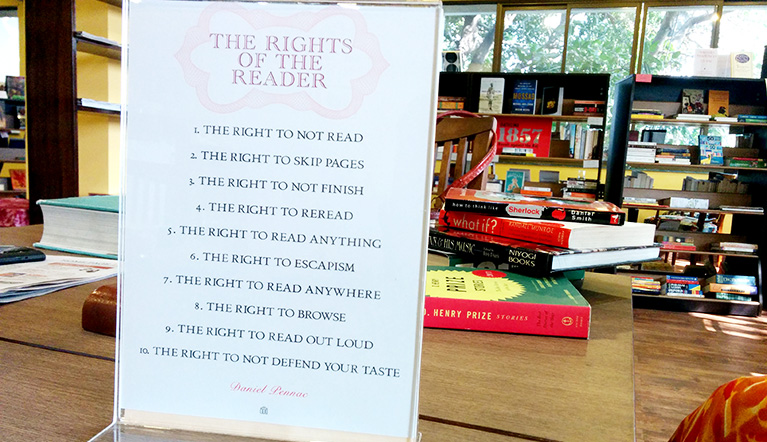
“The library needs to be built on a two-way relationship, between us and the reader.” Photograph by Arun Kale.
Did you spend some time pursuing investors, or is Trilogy self-funded?
Meethil: It’s self-funded (smiles).
Why did you decide to take that route?
Meethil: When we thought about starting Trilogy, we made this whole business plan from scratch: we outlined our revenue models, operations, etc. and met with our accountant to discuss what would be feasible. All this was before we even started looking for a place for the library. We spent a lot of time preparing drafts of what it would be like. We thought about the exact layout, how many shelves we would need to house 10,000 books, what the dimensions of each shelf would be, the colour scheme, what sort of lights we would use, etc. We carefully detailed every single aspect of the library. When an investor comes into the picture, all that falls apart. Then you have to have a coffee shop in the space, you have to have X amount of money coming in every day, you have to have monthly reviews, etc. We knew the risks involved when we were making our plans, and we knew that we’d probably drain our bank accounts dry and might be back at our old jobs after five years (laughs). We felt that there was no need to go to someone else who would dictate terms; we wanted to retain control over every aspect of the space, and be free to make decisions quickly.
How did you settle on the location for the library?
Ahalya: Initially, we asked a couple of real estate agents to look for a space for us, but each space they showed us was just not right. We had visualised a place which would be quiet and have a lot of natural light. We were initially divided about whether it needed to be facing the main road, but later decided that it wasn’t essential. We wanted a really huge space, but we had limited resources, and the rent in Mumbai being what it is, we were worried. We looked in Bandra initially, but were forced to look at smaller spaces like garages, etc., and we decided that they wouldn’t work for us, as Trilogy was meant to be a library, book store, and event space. We found other places on the top floors of buildings that had low ceilings and grey, dreary atmospheres, and we were almost on the verge of giving up when we found this space at Raghuvanshi Mills. It was a total mess when we found it, and we were very skeptical. But it was quiet and had a lot of natural light, it had an open floor plan with a high ceiling, and there were trees surrounding it. It really clicked with us.
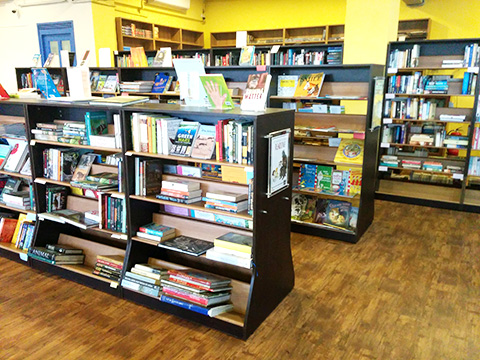
“We wanted to retain control over every aspect of the space, and be free to make decisions quickly.” Photograph by Arun Kale.
You mentioned earlier that you have your own system of procuring and classifying books at Trilogy. How did you go about putting the initial collection of books together? How long did it take you?
Meethil: We started buying books for this space in January last year. Since then, we’ve been buying books every day, from various sources. We mainly buy books from book distributors, but if we need a book quickly and don’t want to wait, we don’t mind buying them from retail stores as well.
Ahalya: We’ve been refining our own reading tastes for many years now, and we’re always in the frame of mind where we’re either choosing books for ourselves or for someone else. When we decided to start Trilogy, we created a list of titles that we would not have. For example, there are many bestsellers that aren’t well-written, or written by me-too authors, and we didn’t want those kinds of books at Trilogy. If people like those books, they have many other ways of buying or borrowing those books. What we have at Trilogy is books that aren’t very easy to find at most book stores, or other libraries. When we look at a genre of books, we look at the new books in that genre, and at books that are landmark titles—those books that really helped to usher in a certain kind of thought or movement, or inspired a number of people. Our collection is growing steadily and is not influenced by market forces. We understand that some of the books are very expensive and don’t have a huge readership, but they have a long life, and are made with a lot of love. These books should be showcased. We also look to our readers to recommend books to us.
Yeah, you said to me earlier that you encourage your readers to ask for new books, and that you order books specifically for them.
Meethil: Yeah, we do. The actual shelf capacity of the library is 10,000 books, and currently we have only about 6,000. The reason for not stocking 10,000 books from the beginning is that the library needs to be built on a two-way relationship, between us and the reader. If people want to read books, we are happy to buy them and add them to the library. And when we know the backgrounds and reading habits of many readers, it becomes easier for us to recommend books to a wider variety of readers.
Have you come across any readers at Trilogy that you’ve had some trouble recommending books to?
Meethil: Yeah. One of our earliest readers is this guy who finishes one book every night. He only wants high-action mystery/thriller books. And the books need to be extremely engaging, and of a certain standard of writing. It was really difficult for us to recommend books for him initially, because that genre of books has a high percentage of titles that are rubbish, and which wouldn’t suit his tastes. We ended up creating a lot of if-then flow charts for this reader (laughs).
Ahalya: We had to really run hard to stay ahead of him. That kind of reader really challenges and eventually enhances our knowledge of the reader community. Now, if we get other readers who like similar kind of books, we know exactly how to deal with them.
Meethil: The other extreme is people who come to us looking for recommendations, who haven’t read anything for the past year or so. That throws our whole process out of the window. And there are other readers who want only thin books, some who only want thick books. There are some readers who want books that suit their particular attention spans. We find that there are a lot of readers who are coming back to reading due to Trilogy, and it is our duty to find them books that they will like.
These days, everyone loves to talk about how no one reads any more. Keeping that in mind, how nervous were you when you thought of starting the Eternal Library and Trilogy, a brick-and-mortar library and book store? Were there a lot of people who warned you that it wouldn’t be worth pursuing?
Ahalya: (Laughs) There are still people who warn us against it. But we’re both very stubborn, and we’re very convinced that there are enough readers and that this is the right time for Trilogy. People are coming back to books. A lot of people think that not many people read these days, and that is true. There aren’t enough readers for particular books, perhaps, or maybe people don’t have the time to read. But there are still a lot of avid readers, and they really surprise us with the lengths that they go to to procure a book and to make time for reading. A lot of moms are doing their best to get their kids to read. It’s a great feeling to hear a kid say, ‘I’m bored, I want a book right now.’
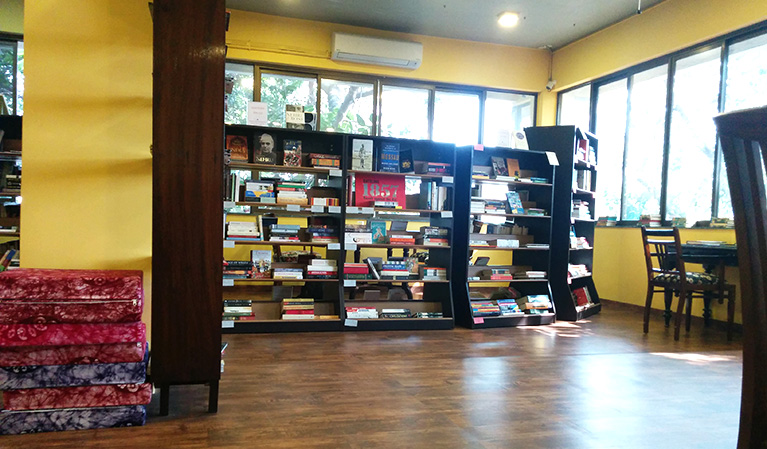
“A lot of people don’t read because they can’t find good books to read. And if we can provide access to that, then maybe reading habits will be rekindled.” Photograph by Arun Kale.
Do you find that that’s true with young people, mostly, or with older people as well?
Meethil: With both, actually. If you compare across age groups, there are actually more older people who are interested in finding books that they actually want to read, regardless of whether the books are old or new. It is very gratifying to know that there are people who will come to a physical space to interact with books. Coming back to your initial question, the publishing industry is actually growing year-on-year in India, and there are figures to prove that. Book sales are increasing, whether via Flipkart and Amazon or via brick-and-mortar stores.
You don’t think the publishing industry is in trouble?
Meethil: It’s not. Publishing houses in India are doing well. They’re not shutting down or making losses. Malls are shutting down, but not publishing houses. And if books are selling, someone is reading them. Maybe we feel that books aren’t selling because when one is travelling in a train, you don’t see people reading books. Maybe one person in the whole compartment is reading a book. Everyone is on their phones. When you travelled by trains 15 years ago, when I was in school, everyone was reading a book or a newspaper. That has changed now. There are people who drive everywhere and don’t have time to read books, and audio books work for them. There are others, like my dad, who experience the same book in both physical and audio format. And the two of us are not against devices. We’re even thinking of setting up an experience zone in one corner with two Kindles, which we will buy e-books for. We are for readers and for books. Whatever gets people reading is good. A lot of people don’t read because they can’t find good books to read. And if we can provide access to that, then maybe reading habits will be rekindled.
Do you find that these days, a book has to be really good to hold your attention, since there are so many other things competing for it?
Ahalya: Absolutely.
Meethil: Yes, correct. And books have to add value. Be it new moms, or people who are working a lot—a lot of people are looking at charts and numbers all day, and they don’t want to go back home and read. They’d rather just watch some T.V. at night and go to sleep. I can’t argue with that. It’s completely valid, and no one can force other people to read. But let’s say someone has time for just one book a month, even if they can read just five pages a day. Since the person has such little time, and can only read 10-12 books in a year, then they really need to choose what they read carefully. And that’s where we come in. We’ll find something for everyone.
It’s only been a couple of months since you’ve started Trilogy, but are you considering branching out into other cities at some point? What do you see as the way forward?
Meethil: Yes, maybe sometime next year. We’re looking at opening Trilogy in other cities. We have our eyes on Pune and Bangalore, to begin with. Especially Pune. Delhi will come last, because there’s a huge reading culture already in place there, and we don’t want to disturb any existing trends. But yeah, we’re definitely looking at expanding.
Ahalya, you were a freelance editor before you started Trilogy, and Meethil has been a wildlife photographer for a while now. Both of you are avid travellers and have been used to certain freedoms in your professional lives. Trilogy is open seven days a week from 9 a.m. to 8 p.m., and you have to be at the space all-day, every day. What has the transition been like for you? I know that you enjoy what you’re doing, but is it a challenge to know that this is your life for the foreseeable future?
Ahalya: The best thing about doing this is that our day is very full. Most importantly, we’re out of our shells, and we’re always meeting new people. And a lot of our readers are becoming our friends—they’re calling us home for dinner, and to do other things with them. And we’re now realising that there’s a whole world out there (smiles). The bad thing is that on most days, we’re too tired to do any of those things at the end of the day.
Meethil: Both of us like being together. So it’s good that we’ve started Trilogy together. If she wasn’t a part of this, then it would be very boring, and I wouldn’t be doing this. For me, it’s as simple as that. Yes, at the end of most days, we’re very tired, and sometimes we wish we could do things like watching movies or meeting friends, but it’s usually too late for that. There are small compromises, but this is something that we’re doing together, and we enjoy it.




